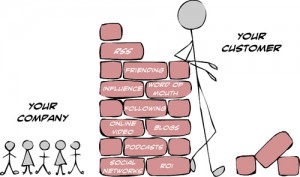 Steve McKee, the founder of McKee Wallwork Cleveland, BusinessWeek advertising columnist, author of When Growth Stalls, and friend wrote recently here about branding and how the tide has shifted. He says you no longer control your company’s brand; your customers do.
Steve McKee, the founder of McKee Wallwork Cleveland, BusinessWeek advertising columnist, author of When Growth Stalls, and friend wrote recently here about branding and how the tide has shifted. He says you no longer control your company’s brand; your customers do.
Think about that for a second. You no longer control your company’s brand; your customers do.
It used to be that the big, Fortune 500 companies would spend millions of dollars on fancy advertising and huge global PR campaigns and years and years and years to tell their customers and prospective customers what they wanted them to think about the brand. If someone was happy with the product or service, they wouldn’t tell anyone. If they were unhappy, they’d tell five to 10 people and hope to get attention through a nastily written letter to the CEO that almost always went unanswered.
Now, with the speed of the web, customers tell not just a handful of people, but thousands if they’re happy or unhappy about doing business with you. That’s good and bad. In the “old days,” people wouldn’t tell their friends and family if they were happy, but they now go out of their way online to talk about the great experience they have with you. Likewise, they badmouth you online in a moment’s notice, in the hopes that you’re paying attention and will fix their issue immediately.
Let’s start with the good. Twitter, Facebook, YouTube, Flickr, and Foursquare are all changing the way we do business, both as company leaders and as consumers. Let’s say you have a retail location and one of your brand loyalists, “checks in” on Facebook Places or Foursquare (both location-based tools that link to a person’s network). That person’s 500 friends see them check in and, having never heard of you, ask about your store. Suddenly you have new customers because one loyal person told their friends…and their friends told their friends who told their friends who told their friends.
Or, you have a service business that doesn’t have brick and mortar. Most of us built our businesses through word-of-mouth and referrals. You go to lunch with a client and the client tweets, “Having lunch with Gini Dietrich and her amazing team.” Suddenly your client’s friends want to know why Gini’s team is so amazing and what it would take to get to work with them.
Let your customers control your brand and tell their friends.
Now, the bad. The story I like to tell when I speak is that we have a client who owns assisted living homes in Illinois and Indiana. I was traveling with their CEO in March and we were on their Facebook wall, as I showed him what our respective teams were doing together to develop their social media presence. While we were on there, we noticed a resident’s daughter had posted how unhappy she was with a hair cut her mother had had that day. She ranted and raved and wanted someone to respond.
This was after 9 p.m. in Chicago, which meant our teams weren’t monitoring the wall at that moment. So the CEO posted a comment to her that said something along the lines of wanting to help her and asking her to direct message him her email address or phone number. She did. They chatted. He ended up giving her mother a free hair cut.
But this is where the magic happened: The woman went back to the Facebook wall and said how sorry she was that she’d said negative things about the company, that the issue was fixed, and she’d recommend the home to any of her friends looking for help with their parents.
With a simple email exchange, he turned an irate customer into a brand steward.
It’s a new world where your canned messages are no longer enough. Pay attention to what your customers are saying about you online. Participate in the conversation. Listen to their wants and needs. Let them help you with customer service, new products/services, and market research. Let your customers tell their friends about your brand.
What tips do you have for those who are scared of letting go of control in the new online world?
* Fabulous image from RonAmok